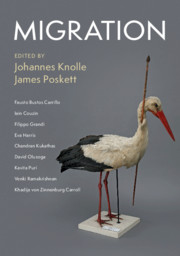Book contents
- Migration
- The Darwin College Lectures
- Migration
- Copyright page
- Contents
- Figures
- Notes on Contributors
- Acknowledgements
- Introduction
- 1 Black and British Migration
- 2 Immigration and Freedom
- 3 Art and Migration
- 4 Refugees and Migration
- 5 Migration of Disease
- 6 The Partition of India and Migration
- 7 Migration in Science
- 8 Animal Migration
- Index
2 - Immigration and Freedom
Published online by Cambridge University Press: 25 March 2020
- Migration
- The Darwin College Lectures
- Migration
- Copyright page
- Contents
- Figures
- Notes on Contributors
- Acknowledgements
- Introduction
- 1 Black and British Migration
- 2 Immigration and Freedom
- 3 Art and Migration
- 4 Refugees and Migration
- 5 Migration of Disease
- 6 The Partition of India and Migration
- 7 Migration in Science
- 8 Animal Migration
- Index
Summary
Immigration is the subject that dominates politics in our time, most particularly in the liberal democratic Western countries of Europe, North America, and Australasia. While immigration has become an issue in many other nations – from Singapore looking to manage local attitudes to its large expatriate population, to Colombia facing an influx of desperate Venezuelans – in the liberal democracies it has provoked a backlash against outsiders as politicians as well as analysts of various stripes identify it as an existential question. Immigration for many is not just a source of unwelcome competition in the labour market or a problem for citizens struggling to gain access to over-subscribed public services from transport to health care. The threat it poses is not a financial one, or a matter of inconvenience, but an existential one.1 Immigration poses a threat to fundamental liberal, democratic (American, Australian, Canadian, British, or European) values. It is for this reason above all that immigration must be controlled: to protect those values; and, by doing so, for these countries to take (back) control of their destinies. To some extent, it is the fear of losing control more broadly speaking that drives the imperative to control immigration.
- Type
- Chapter
- Information
- Migration , pp. 18 - 49Publisher: Cambridge University PressPrint publication year: 2020



